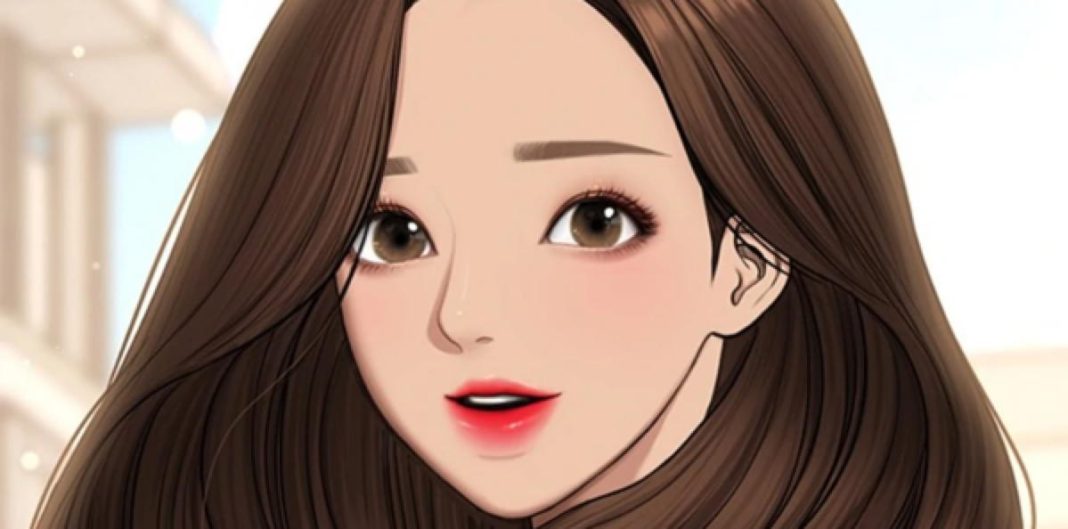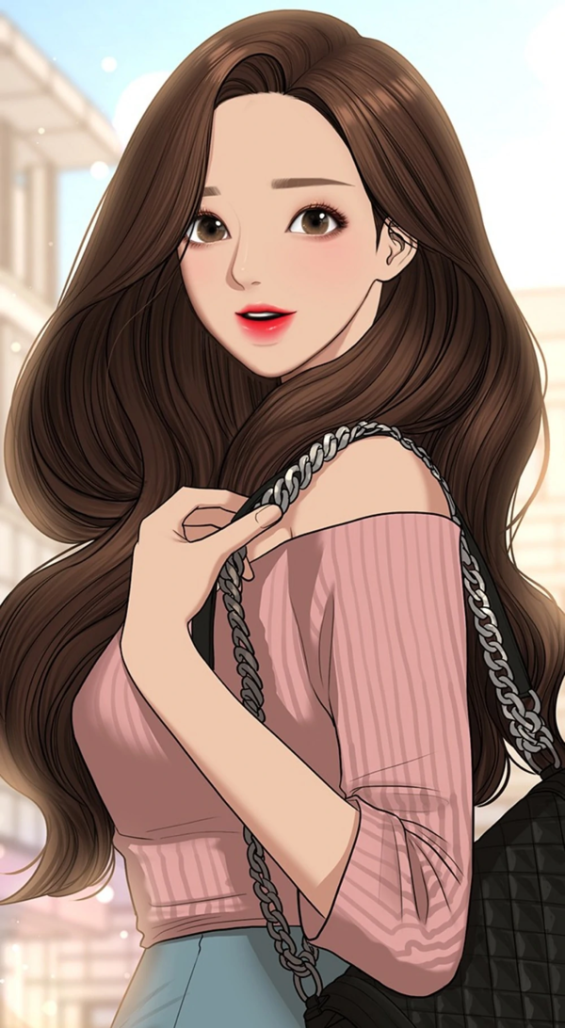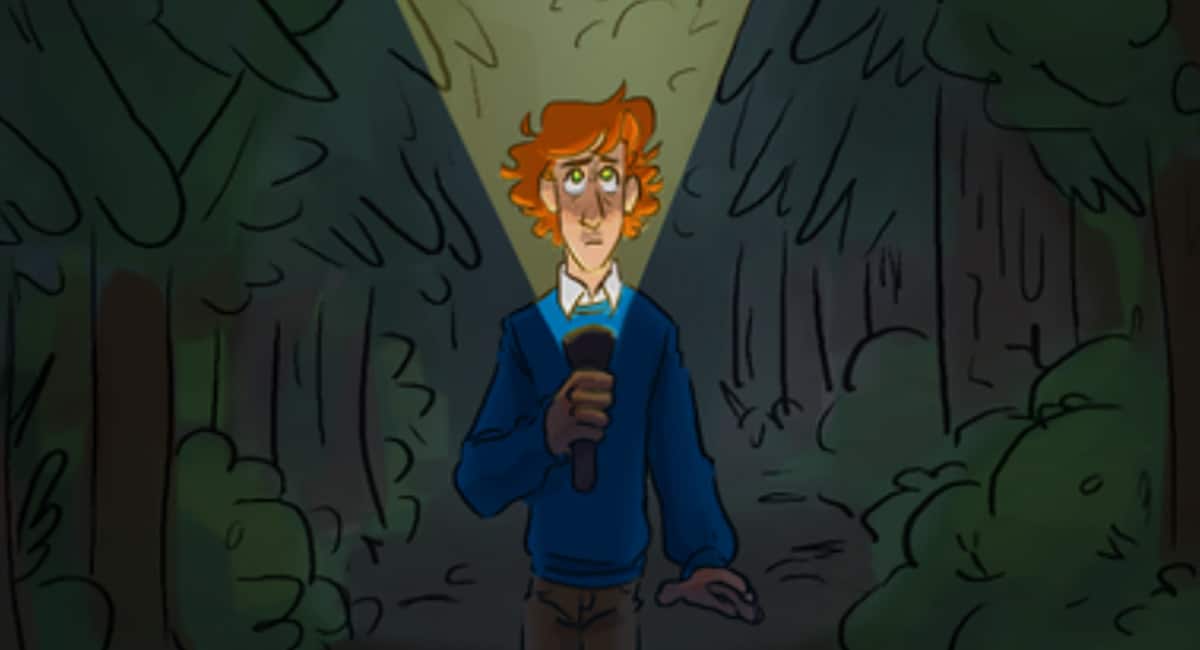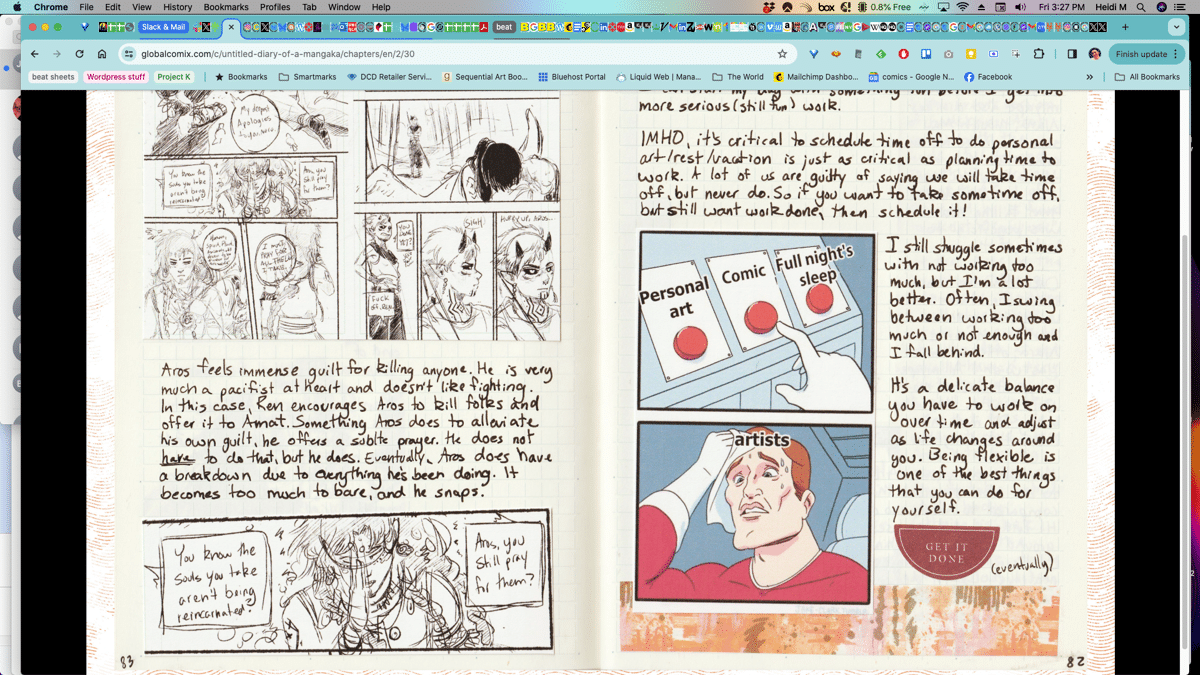By Marion Peña
Spoiler warning: this review will contain spoilers for several major events that happen throughout the main series.
Content warning: there will be discussion of some heavier themes this series tackles, including obsessive stalking, domestic violence, PTSD, and suicide.
True Beauty is a romance dramedy comic on Naver’s Webtoon about the struggle of learning to love yourself. Its characters are mired in emotional turmoil, as they stumble through their integration into society. The main female lead is Jugyeong Lim, a girl in love with alternative rock and horror comics/movies. Throughout middle school, she was incessantly bullied for her appearance–bushy eyebrows, acne scars, monolid eyes, basically anything considered conventionally unattractive to Korean teenagers.
It took her to online forums, desperately in search of a solution to stop her suffering, so that she could look in the mirror and not be reminded of how toxically everyone has treated her. That was how she discovered the power of makeup. Enter high school: Jugyeoung has finally forged the skill and experience to mold her style and fashion into what suits her. She finally has friends! But lurking underneath whenever she goes home and washes her face before bed is a reminder of why she needs to expend so much effort into her outward appearance. A stark reminder that all of her connections and happiness rests dependent on the fact she has to form a persona. Horror is creepy, so don’t talk about it! Acne scars are ugly, you better cake on that concealer! Contacts can make your eyes bubbly and approachable! It’s so much effort, but people will treat you with actual human decency and compassion! And that’s what Jugyeoung has been craving since an early age.
Jugyeoung Lim, wearing makeup. Credit to Yaongyi and WEBTOON.
You see, she’s the middle child of her family. Her older sister is an academic overachiever, and her younger brother is the princely baby. With her mediocre grades and homely appearance, even her mother can’t seem to help but treat her more harshly, even if she doesn’t mean it. This is why she leans so deeply into her niche hobbies–it’s a means to revel in the unconventional, and find comfort in the abnormal. Unfortunately, she doesn’t have any friends to share in those interests, until she meets our first male lead, Suho Lee. They bump into each other one night at the comic store after school, both aiming to snag the latest volume of a Junji Ito series. Naturally, this is after she’s taken off her makeup for the day. He’s abrasive, and leaves after taking the book for himself. The next day, they meet again but Jugyeoung recommends against one series Suho tries to pick up, saying that halfway through the writing takes a nosedive. At her behest, he tries something else, and to his surprise, he enjoys it! The develop a rapport all the while Jugyeong is wracked with terror as she realizes he goes to her school and has no idea who she is because her appearance is so starkly different. This terror and fear is apparent and inherent to her throughout the entire 223 episode run of the main series.
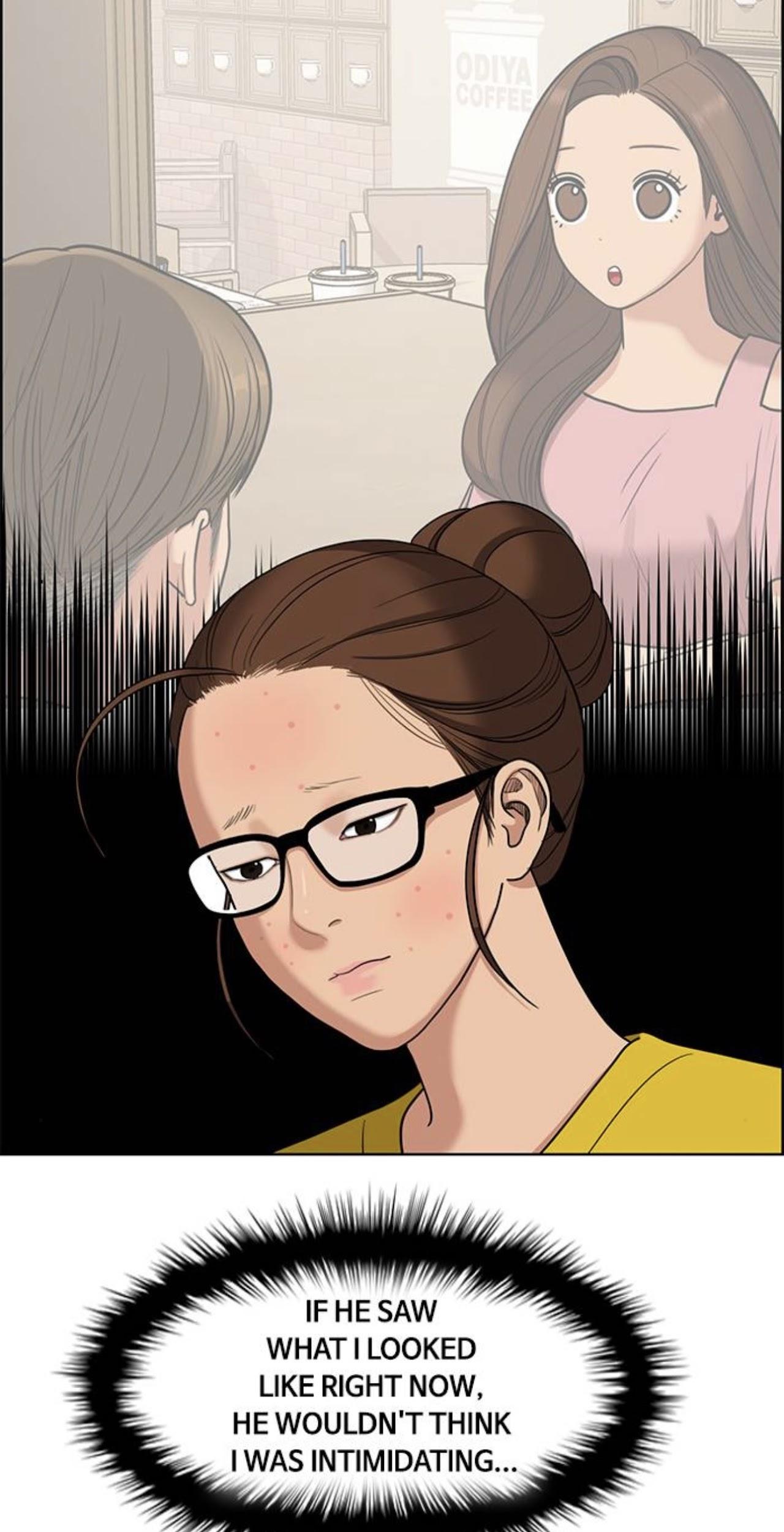
Jugyeoung Lim, without makeup. Credit to Yaongyi and WEBTOON.
It stems from fear of exclusion, fear of rejection, and a fervent desire to be loved. She has spent all of her childhood and adolescence thus far being treated subhumanly. If anyone learned of her secret, that her “natural” look is not so pretty, the only thing she expects is even harsher rebukes and ostracization. It’s a very palpable fear, and the art does a magnificent job of conveying it through the realistically detailed character designs. The proportions of faces and bodies are not heavily stylized, except for comedic segments with SD (super-deformed) faces drawn with flat colors and simple shapes. I was worried initially that such a realistic artstyle would run the risk of making everything look too stiff and robotic, but that wasn’t the case. The faces are extremely expressive, Jugyeoung has a rainbow of emotions, and all of them are shown in raw detail. She cries, she feels scared, she gets happy, she rages, and she gets disgusted. The genuine joy she feels at the thought of sharing happiness with her friends, simultaneously with the guilt seeping in from keeping her bare face a secret, stands out every time author Yaongyi puts it on display.
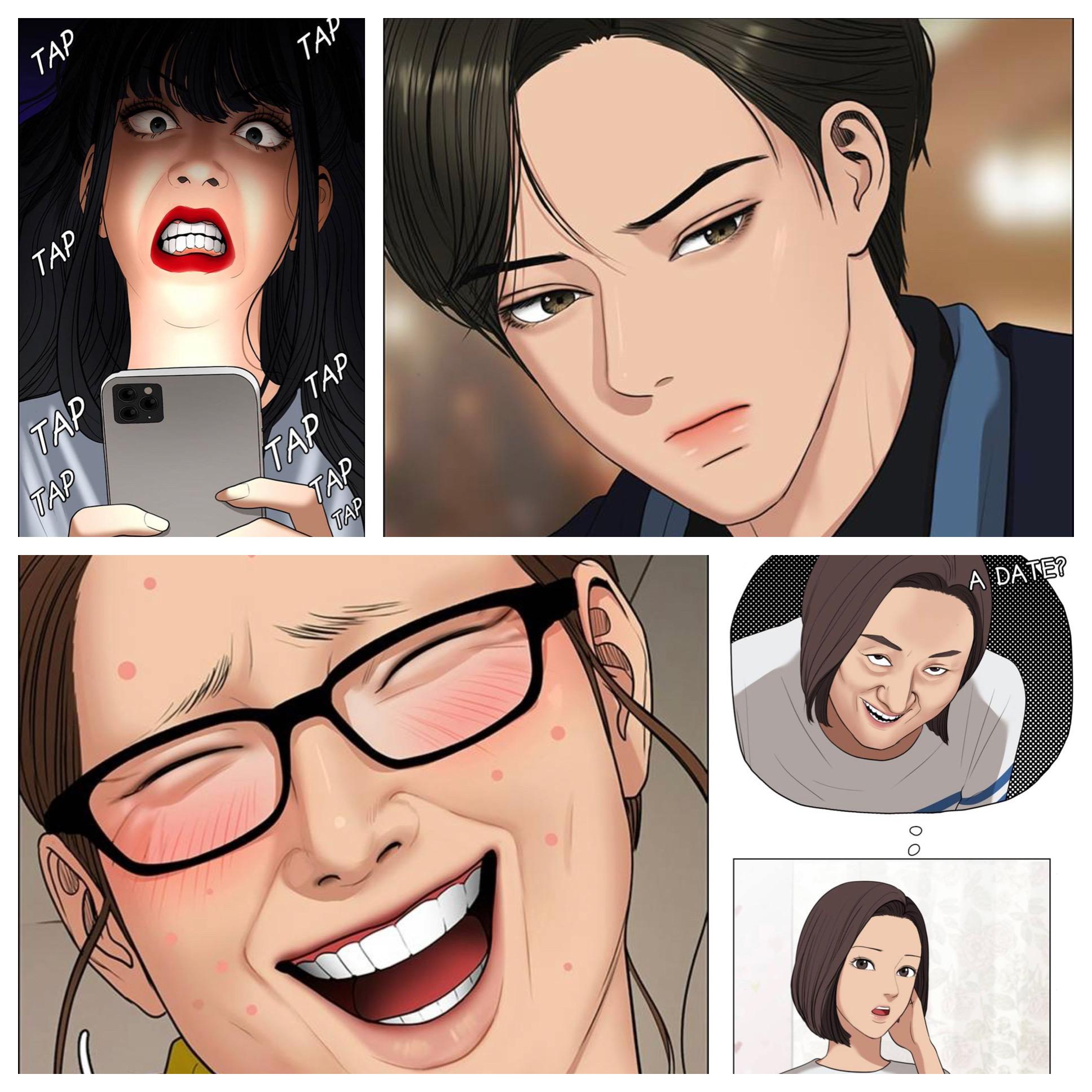
Various facial expressions. Credit to Yaongyi and WEBTOON
So what does it mean when Jugyeoung slips up and her face gets discovered? We wouldn’t have any drama if the status quo isn’t shaken up, and that’s exactly what happens early on with Suho. As it turns out, Suho doesn’t care about that. He has been dealt his own shitty hand in life, and doesn’t care that Jugyeoung’s face at school clashes with her image at school. He’s just glad to have someone that enjoys the same things he does–his first friend in years. Suho is considered attractive, and isn’t a stranger to girls coming up to him for his number or to ask him out. But he can’t afford to think about girls. He has also been bullied–for being Korean-Japanese. It has left him with distrust and wariness to anyone coming up to him solely because of his appearance. When it comes to Jugyeong, he’s just glad to connect with someone else on a personal level, not superficially, after wading through his own swamp of emotions.
In middle school, Suho had a friend named Seyeon Yoon who actually broke into his shell, and invited him to train together as idol trainees with a talented singing classmate named Seojun Han, the second male lead of this series. Long story short, Seyeon, the peppy and likable all-rounder, ends up the victim of a nasty PR cycle from online fans who flippantly decided not to support him. It leads to him overworking and feeling like he has no way out. Seyeon commits suicide, on the day he tries to contact both Seojun and Suho, but both can’t pick up because of their own personal familial issues. This event–which happened in middle school–steers Seojun into delinquency and makes Suho even more antisocial. Suho’s interest in horror stems from morbidity and a comfort that the supernatural isn’t real, or rather, as real as the events he’s had to endure. Along with his first friend dying, he also had to grapple with the death of his mother, and his father’s apparent infidelity in the wake of it–this is the reason he could not pick up Seyeon’s call, and the reason he blames himself for his friend’s death. It leads to episodes of post-traumatic stress for both Suho and Seojun, with Suho opting for therapy and medication to help process his grief. So yeah, in the face of this emotional baggage, Suho doesn’t really care about Jugyeoung’s white lie about her appearance.
For about 95% of the series, Jugyeoung’s secret stays a secret to the vast majority of people she knows. This means that a lot of her internal struggles with loving herself and developing confidence and self-esteem tend to ebb and torrent with how she sees how others perceive her. As a poor student with mediocre grades, when it came to career paths, Jugyeoung was torn between getting a general education–the economically feasible choice–or getting certified in the makeup arts, which is more costly and requires a different entrance exam. She ends up going to a normal university to study visual arts, but continues to pursue her passion on the side. There are several mini arcs where she ends up helping people around her, like students, mothers, or professionals that recruit her, and it becomes clear to her how fulfilling it feels to make people happier with her makeup prowess. This works in the long run, because many of these characters come back in later arcs as ancillary parts of Jugyeoung’s character arc and the main story. There’s a nerdy student in Jugyeoung’s film studies class, who doesn’t know much about fashion, but wants to look nice to impress a girl he likes. She’s apprehensive at first, but decides to help him out anyway because he’s been a good group partner and wants to return the favor. Jugyeoung is almost infamous among her close circle of friends for being naive and quick to sacrifice her own time to help others, but it’s to her advantage because her personality attracts just as many grateful souls as opportunistic ones who’d want to screw her over.
One of my favorite aspects of this story is that we get to see what happens when such a kind, vulnerable person eventually gets shot up to a position of public interest. Through her hard work and active social media presence, Jugyeoung becomes an influencer with hundreds of thousands of followers in this series’ equivalent to Instagram and Youtube. She witnessed firsthand what it’s like to interact with online trolls, seedy starlets, and obsessive stans. Fame comes with barriers to freedom and personal choices. There are times where she gets attacked by malicious comments from jealous and insensitive anons who want to tear her down for simply daring to accept so much attention by having a public profile. It provides a very valid and insightful reason for her to step back and analyze what it means for her to continue living a life where her job is dependent on the perception other people have of her. It’s a unique perspective, especially when you compare it to her love interests Suho and Seojun.
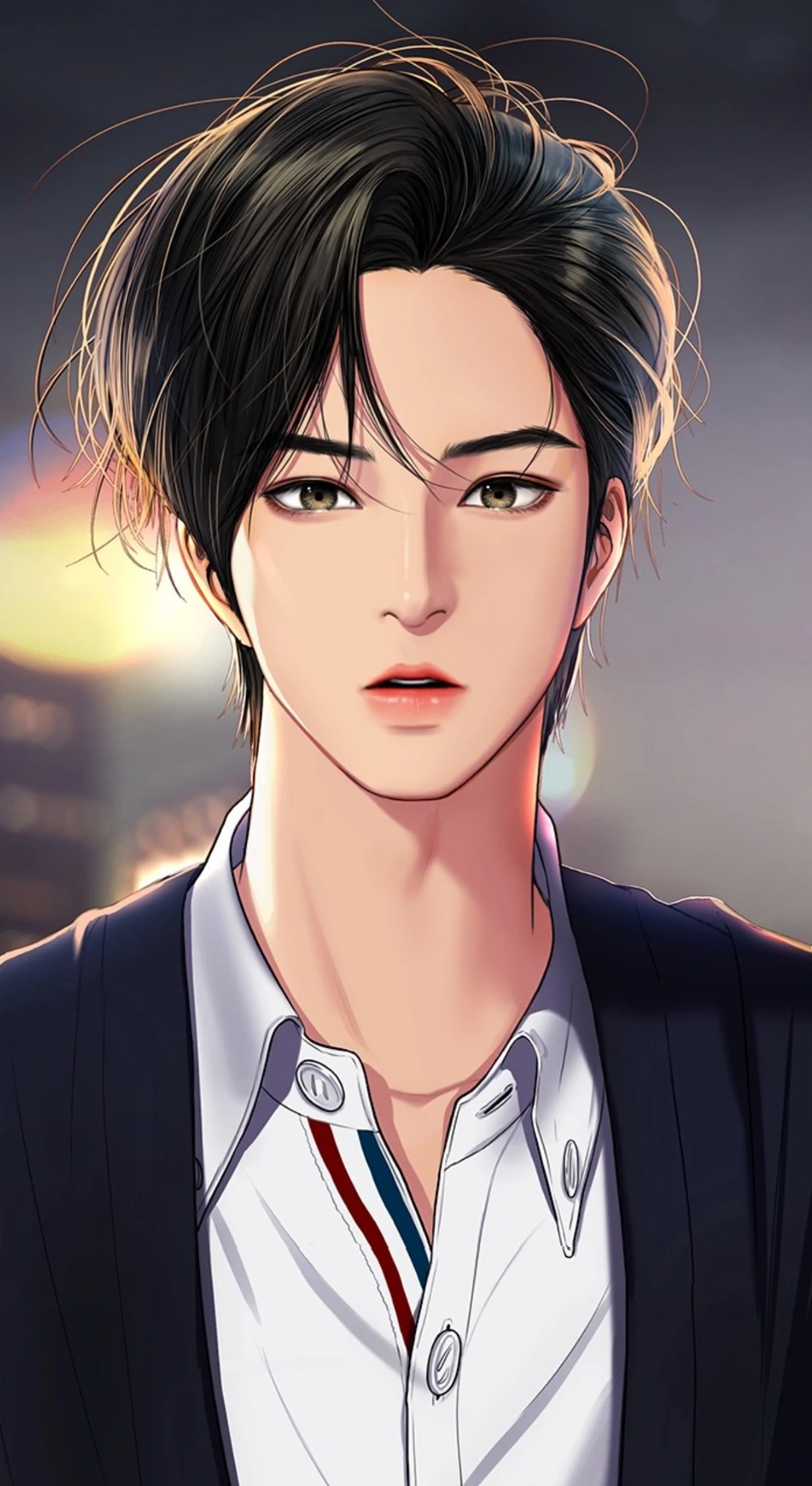
Suho Lee. Credit to Yaongyi and WEBTOON.
Suho Lee is the son of Jooheon Lee, a Korean actor who married a Japanese woman named Yuko and spent a portion of his life overseas before coming back to settle in his home country. Suho witnessed firsthand how fickle the public can be, and after his best friend Seyeon passed away after the cyberbullying and incessant vitriol spewed his way, he wanted nothing of it. Seojun however, came up from poverty, and singing was his ticket to wealth and providing for his sister and sickly, unemployed, widowed mother. One boy rejects fame when presented the choice, the other begrudgingly accepts; both being aware of the dangers that come with it. It’s actually Jugyeoung who convinces Seojun to continue to pursue his dream, in an ironic development that makes that the reason they drift apart. At the end of their high school careers, Suho’s father collapses while filming a new project, and gets taken to Japan for treatment. Suho follows, and at the peak of his romantic tension with Jugyeoung, must forgo pursuing his relationship with her because he still loves and wants to be there for his father–even under the misunderstanding that his father was cheating on his mother after her passing. It was under those circumstances that Seojun and Jugyeoung gradually grew closer, as Suho stopped contacting them and the passage of time allowed them to move on.
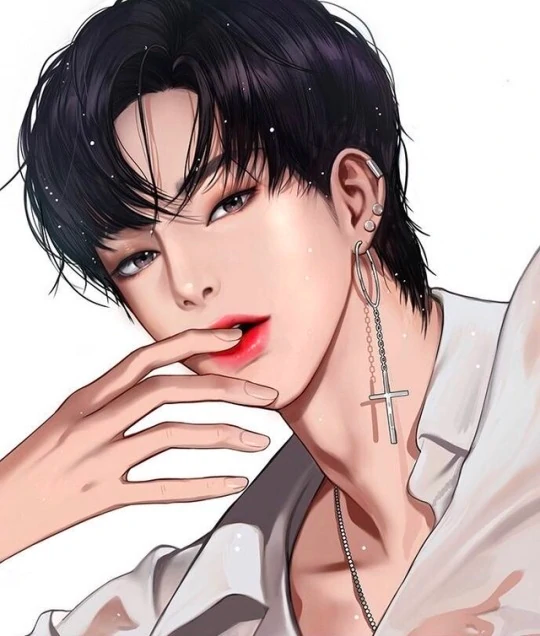
Seojun Han. Credit to Yaongyi and WEBTOON.
Seojun and Jugyeoung eventually begin dating, some two years later and change after Suho is gone. It was during this time that Seojun’s financial troubles came to surface, and Jugyeoung pushed him to go back to the entertainment industry. Unfortunately as success begins to bloom, they also have no choice but to part ways, because being a celebrity or public persona ingrained in Korean idol culture means that fans can be rabid and unforgiving when it comes to scandals or any kind of relationship with the opposite sex. Seojun actually becomes victim to stalking, by an obsessive sasaeng (a Western equivalent being stan or “stalker fan”), who actually approaches Jugyeoung after deducing she might have one of his exes through their Instagram posts. She meets Seojun at a fan meet-and-greet and gives him a teddy bear with a hidden camera. She also infiltrates Jugyeoung’s makeup studies course and steadily changes her appearance to look like her, in order to approach Seojun and usurp her position in his life. It’s genuinely harrowing and terrifying seeing the lengths she went to, and it escalates to the point of violence, where she takes out a knife to stab Jugyeoung. It was Jugyeoung’s plan to confront her alone in order to gather circumstantial evidence to convince the police to take action, but Seojun himself ends up injured instead. These kinds of people exist in real life, and while they don’t always reach this point of harm, the written laws haven’t quite seen to catch up to the modern era in order to protect the victims of such behavior.
It’s not just the main cast who experiences everything that comes with fame and fortune. One of the earliest antagonists, Sujin Kang, grows immensely due to her relationship with Jugyeoung and her follower base. Originally, she was a petty, bitter high schooler who learned early on that her looks were the only thing giving her immediate, tangible rewards. Her father left her family, and her mother became an abusive alcoholic. In middle school, she hit puberty early and it gave her unwarranted attention from the opposite sex. But, in high school, she learned that she could use that attention to leverage her presence in social media and build connections that can eventually catapult her out of her living situation. Unfortunately, the pressure to maintain her physique led her to develop bulimia after she had a depressive episode. This happened quite early, before the halfway point of the series, and I would have been disappointed if that was where her story ended. But it was not.
Things led to another, and at a breakthrough point in her online presence, she was introduced to another abusive relationship–with a boyfriend who manipulated her into streaming Youtube content that flaunted her sex appeal. Whenever she disagreed or talked back to him, he would beat her and scream obscenities, drilling into her a sense of codependency and depleting her self-esteem. He would purposely pummel her in areas that would be covered by clothing so as to avoid suspicion, and guilt her into thinking it was her fault for speaking out. When Sujin one day reconnects with Jugyeoung, she’s filled with a mixed feeling of disgust, jealousy, and confusion. She can’t understand how Jugyeoung has cultivated a following when she was so naive and didn’t even realize that she was being manipulated by her in high school. But when Sujin’s mask slips, and Jugyeoung realizes under what circumstances the former is living in, she instantly confronts her about it and tries to get her out. It culminates in another domestic violence episode where Sujin’s boyfriend actually discards all pretenses and draws blood from attacking her face and body. After he leaves, she locks him out and begins a livestream, asking anyone watching to help her–eventually drawing the authorities to her home as her ex was now desperate for forgiveness and wanted to sweep everything under the rug as a misunderstanding.
This arc in the story was severely intense, emotionally. It wasn’t the first time that it drew on the darkness that people can be mired into, but it was the first time that physical violence was portrayed outside of male-on-male bullying. Author Yaongyi’s portrayal of domestic violence was realistically frightening. Abusers cycle between abuse and acts of apology, reward, and tenderness in order to conceal their behavior and make the victim feel like their abuser actually cares for them; that they’re doing it out of goodness and concern. Sujin was deep into that cycle, and Jugyeoung was able to tell and immediately explain it to her in plain words that were easy to understand. Before, Jugyeoung mostly did the minimum social interaction necessary, but as she began to interact more with others, she developed the quick thinking and charisma necessary to think on her feet. It was a moment of noticeable growth across the board. Jugyeoung was made aware and accepted the fact that she wasn’t actually liked by Sujin in high school after it came up in conversation, but also accepted that Sujin needed help and she was the only one who could tell her what needed to be said. Jugyeoung was also thorough in her follow-up, by communicating and keeping in contact after the incident to make sure she’s recovering; especially after the fiasco left Sujin for the vultures of social media in the public eye.
No matter where you go, the internet will have people talking about anything. People behind a screen will feel empowered to say whatever they want, be it kind, malicious, depressing, sympathetic, angry, or whatever you can think of. Some people don’t learn this until they become famous enough to have those same people talk about them. But True Beauty lets us know that by showing us exactly what it means to be famous. The title gets dropped once or twice within the story, but for the most part, it seems to have been left up for interpretation. Jugyeong never gets plastic surgery, an easy and socially accepted solution in Korea when it comes to beauty standards that feel impossible to uphold for some. She never heals from her acne scars, even though she tries countless treatments and home remedies. She still uses makeup whenever she leaves her house for social events, although opts not to when she’s doing personal errands like going to the comic store. She constantly questions whether she’s worthy of receiving love from her family or her lovers, when she was bullied so much that the idea of showing her bare face to her boyfriend Seojun during an overnight hotel stay gave her so much anxiety she passed out. But even in the face of all of this, Jugyeoung accepts that she deserves it all. She’s worked hard, for herself and for others. She used special effects makeup to allow for a scarred burn victim–who never took a picture with her daughter at her life events like graduations–to finally have a family photo when that daughter finally got married.
True Beauty lies not only in the eye of the beholder; in this case, Suho Lee who has never once stopped loving Jugyeoung, but also in the soul. The climax of the 223 episode main storyline comes as a result of Jugyeoung’s Youtube channel manager, who leaks photos of her middle school years before she began to use makeup. The motive was to draw raw publicity, and at the height of the scandal, flip the public opinion by revealing that her middle school bully was the reason she began to hide her bare face, and the sole perpetrator behind hundreds of evil comments calling for Jugyeong to quit her career and commit suicide. The thing is, these things did happen. Her bully was actually signed to the same management company that scouted Jugyeoung to make her Youtube channel. But her producer/manager, who used to stick up for her and reassure her that there won’t ever be pressure on her to reveal her bare face, ended up doing it anyway in order to silence her bully after the threat of an unconsenting face reveal being thrown into the mix. This scandal tips Jugyeong over the edge, leaving her with no choice but to run away from home for a few days to settle down. It’s during this reprieve that she encounters older women living in a retirement home with agricultural facilities. She learns that even though they’re only in their late 50s and 60s, it’s time for them to take portraits to prepare for their funerals, in case of emergencies. She rediscovers her reason for continuing her makeup studies–to spread the happiness and confidence that comes with bringing out the beauty in someone’s features. The grannies treat her lovingly and express their gratitude at the opportunity to feel like they’re middle-aged again, thanks to Jugyeoung. It was the loving tap on the shoulder that she needed to remind her that regardless of what strangers might think of her, her actions serve a purpose that spreads fulfillment and contentment to those around her.
True Beauty was an intense read. There were moments that gave me whiplash, but plenty more that made me whooping and hollering like a sports fan. It was a satisfyingly bingeable series, and I was grateful to be able to catch up and read the whole thing in the span of about 5 days. The episodes didn’t feel too short or too long, and I felt that it made perfect use of its medium when it came to layout. There were several great reveals that used the lengthwise scrolling of my smart device to its advantage by building up tension. I think it was this feeling, equivalent to a thrilling “page-turner” in physical books, that led to me reading it so fast. Another advantage that I’ve seen utilized only by a few other digital series, such as Pocket Comics’ Lady to Queen, was the usage of BGM, in Episode 150. The song used is a vocal track, presumably sung by the character Seojun, as it uses lyrics he sings later in the same episode. It made for a uniquely emotional reading experience that stood out very easily among all the other series I’ve ever read. As webtoons and digital manhwa continue to spread worldwide, I can easily see this being more commonly used at least once for majorly popular series for climactic moments. It’s ingenious because live action dramas and animation are immediately considered to be the most logical form of expansion for these kinds of stories, but allowing for the visual comic to flourish with an aural enhancement now seems like the alternative standing right in our faces. With concepts like leitmotifs for characters or main/title themes, it allows for fans to dig deeper into the artists’ work and have a sharper idea of what those creators had in mind for their worlds.
Overall, I highly recommend True Beauty if you’re in the mood for drama. Every episode of the main story is free to read on WEBTOON, and there are 8 side story episodes available on their Fast-Pass. It also has a 16 episode TV drama available on Viki. It’s an engaging, uplifting story about learning to lay yourself bare to the people you love, after learning how to love yourself. The way it approaches how social media functions in modern society also helps to ground it in realism. It’s a modern day Ugly Betty, for comics lovers! With 940+ million global views, I think there’s probably something that was done right.
Marion Peña is a Dominican writer based in NYC. They’ve been reading manga and comics since childhood, and writing/podcasting about them since 2015. If you’d like to see more of their work, all their projects are here: https://microwavey.carrd.co/


